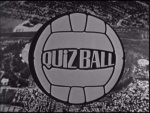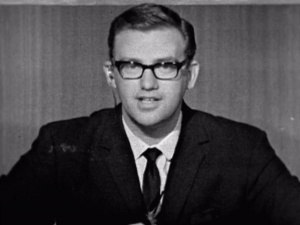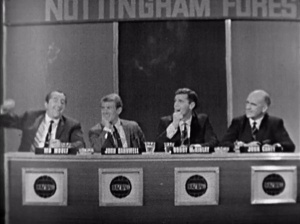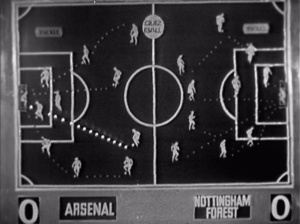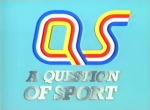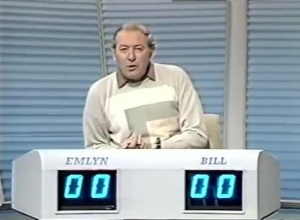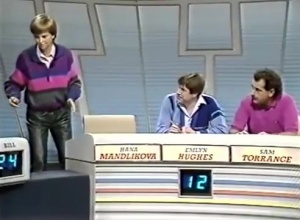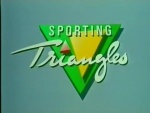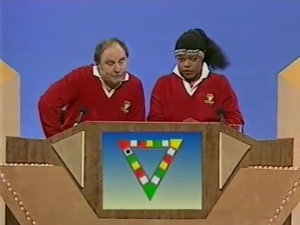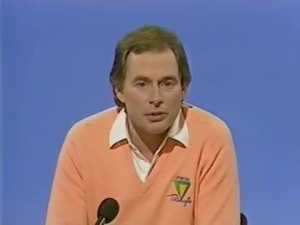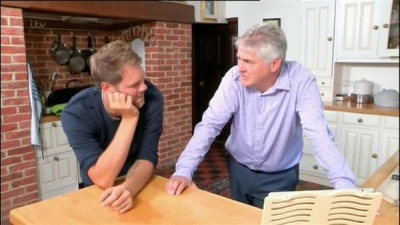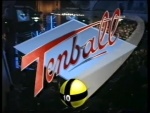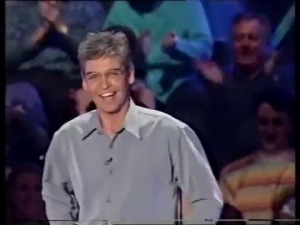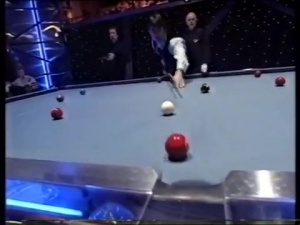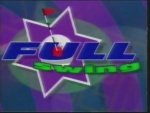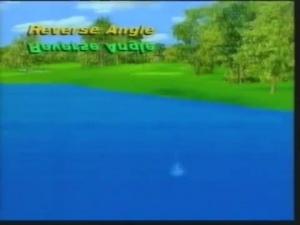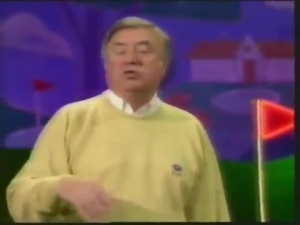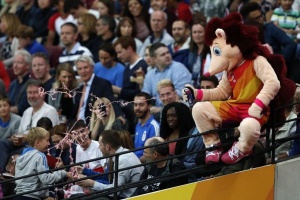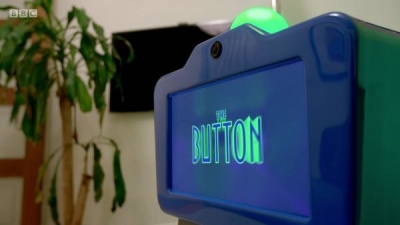Weaver's Week 2018-07-15
Last week | Weaver's Week Index | Next week
If football is coming home, as we were told this week, it must have left home at some point. Some would argue that it came back in 1966, dropped off some washing for its mother to do, then hung around with its old school chums all summer.
An FA XI won the men's world cup in 1966, and it made the sport much more popular than it had been. People went to see more matches, attendances rose about 15%. On television, Match of the Day was promoted from BBC2 to BBC1, and there was all sort of soccer-related entertainment.
Contents |
Quiz Ball
BBC1, 22 December 1966
Quiz Ball was one of these ideas. David Vine hosted the show, and began by introducing the teams, the manager of a men's team, two of his players, and a celebrity supporter.
David spends a couple of minutes explaining the rules in great detail. We'll begin with a buzzer question, and the person who gets it right chooses how to shoot at goal. They can take four easy questions, three more tricky ones, two difficult ones, or they can shoot at goal in one question. All of these will have to be answered solo.
The opposition can put in a tackle if they wish – this has to be played on the final question before a shot at goal. It's a very difficult question, the team can confer. Get it right and they take possession at midfield; get it wrong and the goal is scored.
All of these rules before a single question is asked. They wouldn't make a show like this nowadays; they'd ask the first question then explain how to shoot, and introduce "tackles" when they got round to it. Nor would we see players smoking at the desks.
They might also explain "passes" – all the questions to goal are meant to be solo, and if the player answering gets it wrong, it's on the buzzers to their team or the other.
While it was thrilling to see your football heroes in the studio, doing something other than football, this initial edition of Quiz Ball had a major flaw. It had too much interruption. Every time the team gets close to goal, the opposition buzzed in and tries to tackle. It becomes a battle of what the teams don't know, rather than what they do. Perhaps they might have allowed each player to make one tackle each show, because defensive battles get a bit dull. And perhaps they might have fixed this later in the show's run.
Quiz Ball made its mark on the football lexicon, a direct attack on goal from distance became known as "Route One". Commentators used this as shorthand on Match of the Day, when a defender would hoof the ball upfield and hope their target man can get to it and bundle it in the net. Route One football was most popular in the early 1990s, favoured by notorious manager John Beck. His catchphrase at Cambridge was "Simplicity is Genius", the complete antithesis of the complex Quiz Ball format.
The show was produced and devised by Bill Wright, who would go on to devise Mastermind. Quiz Ball had a little too much faff, Mastermind is the slickest of slick quizzes.
Football went away in the early 1970s, swallowed up by hooligan behaviour, superior overseas sides, and extreme television restrictions. Can we imagine a world where there's no football at all on television? That was the case in autumn 1985, and the television companies went off and made their own entertainment. Football had gone away, replaced in popular affection by speedway and snooker. Television still showed the old standbys, horse racing and cricket and golf and track-and-field athletics.
A Question of Sport
BBC1, 19 March 1987
We move to the nadir of football's popularity, the late 1980s. The continuity announcer promises "knitwear as varied as the questions". Emlyn Hughes is joined by Sam Torrance (golfer) and Hana Mandlikova (tennis player), Bill Beaumont is accompanied by Charlie Nicholas (footballer) and Peter Scudamore (jockey).
First up is the numbers board, still pictures of famous sports people. To help the guests, amongst the dozen is a golfer, a tennis player, a jockey, and a footballer. Most of the others seem to be cricketers and athletes. Then to the It's Your Sport round, film clips on the sports for which our stars are famous. Gives them a chance to shine, and not look like dunces. Leave that to the captains, who would normally get an obscure sport – except this week, they're on football and rugby.
The come the rounds everyone remembers – the Mystery Guest, a special clip of film, shot to give little glimpses of the sportsperson. Home or Away, a question on your own sport or one on any sport for more points. What Happened Next, a round they found easier to source before the internet. The One Minute Round was nine questions in a minute, including one of everyone's home sport. And back to the picture board to close.
Under the chairmanship of David Coleman, A Question of Sport was crisp and tight. There's just enough time to appreciate the answer we've been given before we move on. We're never rushed, but we never dally on any point.
The atmosphere comes from the personalities, and their genuine levels of competition. Emlyn Hughes rattles off all sorts of football team names, except the team he wants is the one he played for. Hana Mandlikova stands up to demonstrate her answer in "What Happened Next", showing a very 80s pair of leather trousers.
David Coleman is happy to rib the captains about gaps in their knowledge, and exudes quiet authority. He can talk about the right answers and the wrong ones, it's like the answers were only on the bottom of the questions to help the producers.
A Question of Sport continues to this day; David Coleman left in 1997, replaced by Sue Barker. It's become a looser show, more chat and banter, as seems to be the fashion.
Sporting Triangles
Central for ITV, 24 March 1988
How could ITV compete with A Question of Sport? They couldn't, but they'd have a good try. Three regular players, and three guests. In the sample episode, we see Jimmy Greaves (footballer) with Judy Simpson (athlete and future Gladiator). Tessa Sanderson (athlete) is with Jonathan Davies (rugbyman). Andy Gray (footballer) is paired with Sharron Davies (swimmer and future Gladiator).
To cut to the chase, it's a quiz where most of the questions are on one of the guests' home sports (athletics, rugby, swimming), but a quarter are on any sport (mostly football and snooker, as ITV had television rights to these events). All of these questions had a media component – name someone from their picture, or identify something in the clip.
The actual execution was a lot more complex, and a lot more fussy than it needed to be. Do we really need a computer-generated die to move a shared counter around the board landing on colours? The ghost of Quiz Ball stirs uneasily in its black-and-white grave. Much simpler was the "Try for Ten" question – each team would hear clues to a famous sports person (or city), and more clues meant fewer points.
It's clear that Sporting Triangles was aping A Question of Sport, with stars in unusual positions like on the picture board, and some tricky teasers (at what time in the morning did Fatima Whitbread set her record? 9.08, 9.18, 9.28...) There was even a "Guess the Rest" segment, sufficiently different from "What happened next" to avoid lawsuits.
For our money, Sporting Triangles tried a little too hard. We could see the entertainment coming a mile off, Jimmy Greaves was a taste we could never quite acquire. And while A Question of Sport was filmed the weekend before transmission, and had topical references, we felt Sporting Triangles had been sitting on an ITV shelf for some weeks. Still, the show lasted five years, only leaving ITV when Greavesy's contract ran out.
...All this, and the Poddington Peas
The commercial channel had many and varied sports, as we saw in the clips on Dickie Davies's Sportsmasters (ITV, 1989-90). Snooker, football, boxing, athletics, and clips from the Seoul sports parade. Sports Masters was an all-rounder's contest, perhaps most notable for its specialist subject round. Taken at a fast pace, Dickie could ask 15 questions in one minute; the Mastermind of 2018 struggles to ask 15 questions in two minutes.
Two events in 1990 made football a more welcoming place. At the start of the summer, there was a men's world cup tournament, and the England squad recorded their traditional song. But it wasn't a chant by amateur singers, devoid of tune. It was made with ultra-cool band New Order, and "...world in motion" was a radical departure. In twenty years of the art form, no-one had ever made a football record that was in any way good. It worked on the radio, it sounded awesome in the clubs, and it gave the crowd a new chant. "Eng-land" in two syllables, "In-ger-land" now had three syllables.
At the end of summer 1990, the BBC opened up Radio 5. Here was a home for the Beeb's radio obligations – learning programmes for schools and adults, entertainment for the armed forces, speech programmes aimed at children and young people. And the glue to hold the schedule together – sport. Lots of sport. Midweek sports discussion programmes, live magazine shows on Sundays, and Sportscall with the erudite Danny Baker. He became the voice of the network, hosting football discussion show 6-0-6, and later taking the breakfast programme.
We'd grown accustomed to live football on television, ITV showed a league match most weekends. The new Premier League contract meant there was no top-tier football on television, we either had to pay KYTV, or listen to the radio. Radio 5 was the place, and there were more and more spin-off programmes. Fantasy Football League allowed Ross King to play the straight man to comedians Frank Skinner and David Baddiel. They Think it's All Over was a surreal panel game, Des Lynam kept a very straight face while Nick Hancock riffed on all the sports. And they had a reincarnation of Quiz Ball, without the tackle rule.
Inevitably, television came sniffing around these programmes, and most of them leapt off the radio with haste. By the time Radio 5 was occupied by a rolling news programme in 1994, all that remained was an antique Bakelite and copper switch. It had helped pave the way for football to become cool, and part of the mass culture again.
Football came home in June 1996, when England hosted the European Nations' Cup tournament. Baddiel and Skinner – now the hosts of television's Fantasy Football League – worked with the cool Lightning Seeds to record the FA's song "Three lions". It was an honest song, starting with the refrain "football's coming home", and talking of the hope that football might stay for more than the tournament's few weeks.
What sort of welcome did football get?
Tenball
LWT for ITV, 8 April 1995
While football had been away, snooker replaced it as television's favourite sport. It's easy to film – two or three fixed cameras are enough. It's easy to follow, and divides into natural chunks – each individual frame lasts about 15 minutes, just the right length for television commercials.
More importantly, snooker was respectable. Football had a problem with some of its supporters causing disorder on the pitch, and in surrounding areas. Snooker required its players to wear waistcoats and bow ties, an innovation partly copied on the football field. The leading player was Steve Davis, whose idea of excess was to have fully one-and-a-half spoonfuls of sugar in his porridge.
By the early 1990s, football was checking its map for "In-ger-land", and snooker felt that it had to change a little. Some ideas worked – Big Break married the traditional snooker with the traditional quiz, and made a star out of John Virgo. Some ideas didn't, Pot Black Timeframe asked players to play one-and-a-bit frames of snooker, higher score wins, but points go down for the player who takes more than half the time.
And then there was Tenball, filmed in Westminster during 1995. Phillip Schofield is the host, still with something to prove after his long association with children's television. The first show featured John Parrot, one of the best players in the world. And it featured Ronnie O'Sullivan, a fast-rising and explosive player.
Tenball was snooker with a difference. A lot of differences, to be exact. The new tenball (worth 10 points) sat in the middle of the table, where the blue traditionally goes. Players would alternate reds and colours, but all the colours during a break were worth the value of the first colour potted. Pot the blue, and all colours are worth 5 points; pot the tenball and everything is worth 10 points.
And there were more changes: a rule required that a ball had to hit a cushion on every shot, otherwise it's a foul. This rule was put in to discourage safety play, and make sure almost every shot was a scoring attempt. The punishment for a foul was 10 points or put the cue ball anywhere on the table, such as the best place to go red-tenball. Schofe introduced these changes in voiceover as they were shown – it was slick and enough to get us going. "Other rules will be explained as they arise," he threatened.
On screen, there were unusual camera angles. Tenball pioneered cameras in the corner pockets, something eagerly adopted by other tournaments. Nothing is more thrilling than a ball racing towards you and then falling down. Hand-held cameras allowed for close-ups, shots just behind the player, or close to the table. And the audience was encouraged to be a little louder – they didn't have to remain in funereal silence, they could cheer between points.
As we all know, Tenball didn't catch on. The reason: too many changes at once. Snooker was popular because it's simple, and because it has a certain pace. Tenball changed the rules, both by introducing the titular ball and by removing the safety shot. We can live with these changes: in a made-for-television event, it's reasonable to tweak the rules so as to make good television.
No, the problem was both doing away with safety play and taking away the colour variation. Snooker players win frames by building a break, potting the right red to keep on the high-scoring colours; when all colours are equal, it's less of a skill challenge. When the safety play is also removed – and one muffed safety will cost the frame – it becomes a very different game.
Tenball only lasted the one series, and was ITV's last serious foray into snooker for many years. The gimmick ideas have died away, perhaps everyone realised that you don't need to manipulate a sport to keep it relevant. Phillip Schofield has remained a star, and somehow looks just as young now as he did then.
So, it's two weeks before football comes home. What soccer-related brilliance is the national broadcaster showing?
Full Swing
BBC1, 25 May 1996
Jimmy Tarbuck rolls on set in a golf buggy. He'll spend two minutes making cracks against Michael Parkinson, before introducing the contestants and their celebrity partners. Tim Brooke-Taylor, Ronnie Corbett, and football's own Ian St John. This is 1996, remember, and the celebrity line-up would have been predictable twenty years earlier.
The gimmick on Full Swing was a "virtual reality" computer. The celebrity hits the ball, and it smashes into a reinforced pressure wall. The angle and speed help the computer to work out where the ball would have landed. There's a computer graphic of where the ball landed, complete with some not-very-realistic trees and grass. We don't actually see the ball in flight, computer graphics of 1996 weren't that good. Instead, the ball's location was marked with a circle.
The opening round, "Three from the Tee", had each celebrity make two shots, and the contestant asked two questions. The distance of the shots, plus about 50 yards for each correct answer, helped to get the ball closer to "the pin". We thought this was a golf programme, not sewing.
Anyway, the team furthest away from the target are out of the game, but get to play "The Trick Shot". Er, er, "Crazy consolation", taking a ball along a Heath Robinson contraption to the hole.
"Fairway or Foul" is a timed event. The celebrity fires a ball at a green with lots of hazards – water, sand bunkers, burrowing rabbits, bad comedians telling unfunny jokes. "We poured water down their holes at Easter. We got hot cross bunnies." We got a parking ticket waiting for the laugh.
The contestant answers a question for the celeb to tee off, and another question to escape the hazard. There's also some nonsense about only potting the ball when the hole is lit. This is a timed event, winner makes the final, loser gets a cash prize determined by how well the celeb putts onto a target green.
"The Final Green". Four questions for the contestant, each worth 10 seconds. The player draws another ball, worth between 10 and 60 seconds. For the celebrity, it's £100 per putt holed out, £1000 and a holiday if they get all ten. All the money the celebrities win is for charity, and the contestants get the same value.
Yes, this is Big Break themed around golf, with an irritating piccolo theme, and none of the charm. Big Break had John Virgo to take the edge off its past-it comedian host, Full Swing is all Tarbuck and he desperately needs someone to bounce off.
While ITV was showing the Euro 96 opening ceremony, and England v Scotland the week after, BBC1 showed this old and past-it programme. "I'll make it a flying visit," said football. "But before I go, I'll have England v Spain go to penalties, thus forcing Full Swing off for a week. That'll show it."
As we know, football left at the end of June. Flushed with success, the Football Association put in a bid for the 2006 World Cup, but finished last in the race. Lessons were learned, and taken on by the bidders for the 2012 summer olympics. One legacy of football coming home was a stadium for last summer's athletics championships.
This year's campaign by the Football Association XI has reminded us of 1990. Going into the tournament, the idea was "get out of the group phase, then see what happens." Then it was "ah, quarter-finals, we're interested." Then, "semi-finals? We'll just have that dominate the schedules." And then the slight disappointment of a fourth place finish. The campaign was unexpected, and glorious because it was unexpected.
More football world cup action next summer, when the Football Association XI defend the third place they secured in Canada last time. More orthodox game show reviews next week.
This Week and Next
Best thoughts to Richard Bacon, who was hospitalised this week after contracting pneumonia on an aeroplane. Richard is an incisive and under-rated journalist, and he presented some quality game shows earlier in his career.
Football may not be coming home, but the school holidays are. And so's the rain. If you're stuck at home this summer, why not build your own Button? Andrew Burrows has listed the components, and provided the software. You'll need to use your own skill and judgement to put everything together.
If you'd rather watch The Button on telly, we hear that more episodes might be in the pipeline. We also hear that Mel and Sue's The Generation Game could be back for more modernist anarchy.
It's Rose d'Or time! The EBU Golden Rose for game shows will go to one of these:
- What Would Your Kid Do? (Boomerang / ITV), the one where Jason Manford gets parents to predict their childen's actions. From our review on 18 March, "What Would Your Kid Do? speaks to acceptance. It's a gospel of "hate the sin, love the sinner", automatic grace without exception."
- 5 Gold Rings (Possessed / ITV), the one where Phillip Schofield invites couples to put small rings on a large display. From our review on 26 March last year, "There's barely a moment wasted, and while the show never moves quickly, it never feels like it's dawdling. It's very difficult to get the pace right, and we'll praise a show that gets the pace right." There's a second series in the can, wonder when we'll get to see it.
- Big Bounce (EndemolShine / RTL), where competitors race around an obstacle course powered by trampolines. We've not yet seen this.
- Sorry Voor Alles (Warner Brothers / VRT), where a contestant is secretly filmed for a month, and unusual things happen. At the end, there's a quiz to win some smashing prizes. Again, we've not seen this just yet.
Winners will be announced on 19 September, and we'll review at least one of the overseas competitors.
BARB ratings in the week to 1 July.
- Mark Pougatch's The World Cup recovered some ground. 13.65m (ITV, Thu) saw the event with the very short title Koninklijke Belgische Voetbalbond, Union royale belge des sociétés de football association, Königlicher Belgischer Fußballverband XI prosec The Football Association XI.
- Top game remains Love Island (ITV2, Thu, 4.35m), ahead of A Question of Sport (BBC1, Sun, 4.1m) and Stephen Mulhern's Catchphrase (ITV, Tue, 2.1m).
- Breadxit Crème de la Chequers is sinking fast (C4, Sun, 1.5m), and The Crystal Maze (C4, Fri, 1.05m) also slipped. Mock the Week held firm (BBC2, Thu, 1.4m) and Best Junior Doctors peaked on Tuesday (BBC2, 760,000).
- Taskmaster rolled on (Dave, Wed, 770,000), Blind Date ended its mini-series (C5, Sat, 610,000), and Would I Lie to You? caught the tail-wind on Thursday (Dave, 260,000).
The sports finishes on Sunday, so there's room for new shows. ITV spends the week doing The Voice of This Territory Kids, which will be fun and less popular than this week's shows. Higher culture on a Young Musician Prom (R3 and BBC4, Sun).
!mpossible comes to BBC1 teatimes, Eggheads follows on BBC2, and University Challenge returns (BBC2, Mon). The Crystal Maze moves to civilian episodes (C4, Fri). And if you've been waiting for Wedding Day Winners, it's back on BBC1 next Saturday teatime. Don't forget to miss it.
Photo credits: BBC, Central, ITV Studios Entertainment, LWT, Avalon.
To have Weaver's Week emailed to you on publication day, receive our exclusive TV roundup of the game shows in the week ahead, and chat to other ukgameshows.com readers, sign up to our Yahoo! Group.

